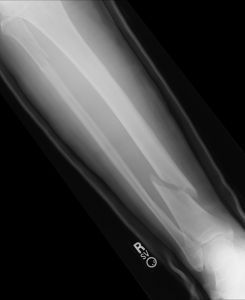Unicompartmental Knee Replacement
The purpose of knee replacement surgery is to restore function, increase mobility, and decrease pain. Many times a total knee replacement is the best option for patients who have severe knee arthritis. However, patients with osteoarthritis that is limited to one particular area of the knee may be candidates for a partial knee replacement (also called a unicompartmental knee replacement).
What are the advantages of a partial knee replacement?
There are many research studies available that support how a modern partial knee replacement performs superbly for a vast majority of patients. There are many advantages to having a partial replacement versus a total replacement of the knee. These include a quicker recovery time, less blood loss during the procedure, and less pain after surgery.
Many report that a partial knee replacement feels more “natural” than a total replacement and the range of motion is often reported as “better”.
Who is a candidate for a partial knee replacement?
The orthopedic specialist may recommend this procedure if you have severe osteoarthritis of the knee and have tried and failed with nonsurgical treatment measures. A partial knee replacement is only considered if your knee problems affect your quality of life and interfere with your daily routine.
Also, your arthritis should be limited to one compartment of the knee, not the entire knee as seen with inflammatory arthritis. Those patients with significant knee stiffness or ligament damage are not ideal candidates.
What should I expect before the surgery?
Your orthopedic specialist, working closely with your family doctor, will determine which type of procedure you need. He may test your range of motion, the ligament quality, and assess your activity status. Patients who have pain located entirely on either the inside portion or outside portion of the knee are good candidates for a partial knee replacement.
Those who have pain throughout the entire knee or in the front aspect are usually better qualified for a total knee replacement. You may have additional imaging tests on your knee to determine which surgery suits you best.
Before your operation, a member of the anesthesia team will evaluate you. Anesthesia will either be spinal (you are awake but numb from the waist down) or general (you are completely asleep). The choice will depend on your surgeon’s preference and your health needs.
What happens during the surgery?
A partial knee replacement generally lasts 1 or 2 hours. The orthopedic specialist makes an incision at the front of your knee in order to explore the three compartments of the joint space. He uses a special saw to remove the damaged cartilage and knee components and caps the ends of the femur (thighbone) and tibia (lower leg bone) with metal coverings.
These metal pieces are connected to the bone with a special type of cement. To create a smooth gliding surface, the doctor places a plastic insert between these two metal components.
What happens after surgery?
After your procedure, you will be taken to a recovery room and closely monitored. Expect to have an IV for around 24 hours to receive medicines for pain control and antibiotics. Once you are awake, you will notice a bandage on your knee and a small drain that collects fluid from the joint space.
Some patients may be candidates to have this procedure on an outpatient basis, but most will need to be admitted to the hospital. You can expect to go home 1 to 3 days following a partial knee replacement.

 A fracture is a broken bone and when a bone is fractured, it is broken. A bone may be completely fractured or partially fractured in many different ways. It could break cross-wise, length-wise, or in the middle.
A fracture is a broken bone and when a bone is fractured, it is broken. A bone may be completely fractured or partially fractured in many different ways. It could break cross-wise, length-wise, or in the middle. Orthopedic Specialists is excited to be a King sponsor for this year’s Ballard Seafood Fest. OSS encourages anyone with a love of seafood, or a love a Seattle to go support the Ballard Seafood Fest this weekend, July 14th and 15th.
Orthopedic Specialists is excited to be a King sponsor for this year’s Ballard Seafood Fest. OSS encourages anyone with a love of seafood, or a love a Seattle to go support the Ballard Seafood Fest this weekend, July 14th and 15th.